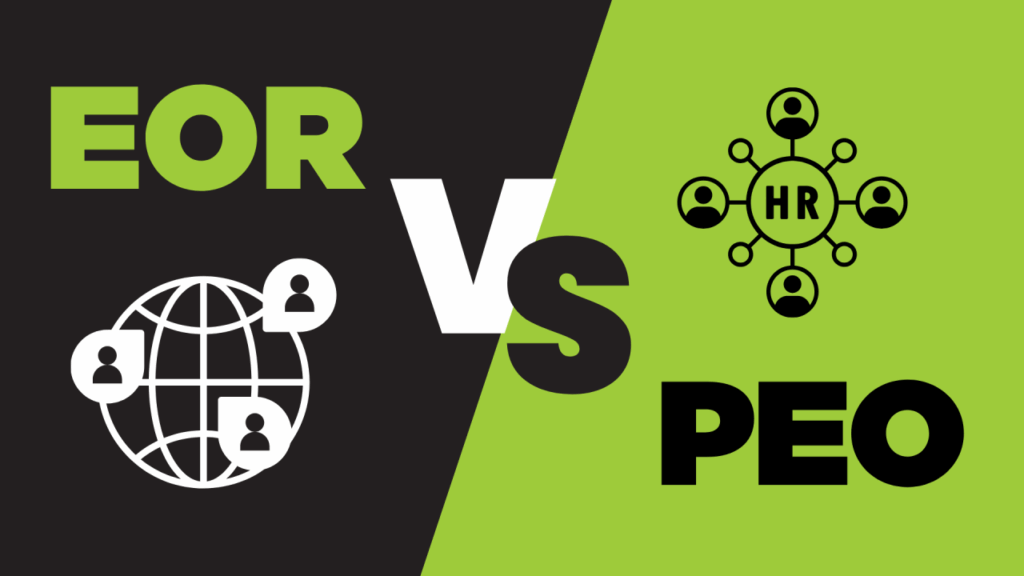- EOR is the legal employer, handling payroll, compliance, taxes, and contracts, which is ideal for hiring without local entities.
- PEO operates on a co-employment model, which requires a local entity but involves sharing HR tasks.
- EOR carries full compliance risk, while PEO shares it with your company.
- PEO is cheaper if you have entities; EOR enables faster global hiring without setup.
- EOR suits quick expansion; PEO fits established entities needing HR support.
Globalization and remote work have changed hiring strategies. Businesses of all sizes are looking beyond borders to find top talent, but compliance challenges, legal obligations, and HR complexities make international hiring far from straightforward. Two solutions arise in this context, namely EOR (Employer of Record) and PEO (Professional Employer Organization).
Both models simplify HR processes, but their structures and responsibilities differ. Understanding these differences is essential for making the right decision for your business.
What is an EOR?
An EOR is the legal employer for your international workforce. This means the EOR is responsible for employment contracts, payroll, taxes, benefits, and compliance with local labor laws, while you manage day-to-day operations and performance.
For companies expanding globally without establishing local entities, this solution removes the need to incorporate in every country. For example, businesses can partner with a trusted provider like Multiplier to hire in multiple regions, complying with local employment laws.
What is a PEO?
A PEO operates under a co-employment model. This means both your company and the PEO share employer responsibilities. While the PEO manages HR functions such as payroll processing, benefits administration, and tax filings, your business retains legal responsibility for the employees.
Unlike an EOR, using a PEO requires your company to have a legal entity in the employee’s country of work. This makes it ideal for businesses that already have local entities and need additional HR support rather than full legal coverage.
Key Differences Between EOR and PEO
Both models are helpful in HR operations. Their differences lie in legal responsibility, compliance requirements, entity details, and the scope of services.
1. Legal Responsibility
- EOR: Assumes full legal responsibility for employment in the host country. If compliance issues arise, the liability rests with the EOR.
- PEO: Shares responsibility with the client. Your company still carries legal risks as the official employer.
For businesses hiring internationally without a local entity, an EOR can help avoid compliance-related risks.
2. Entity Requirement
- EOR: No entity is needed in the employee’s country. The EOR hires on your behalf through its own established legal entities.
- PEO: Requires a local legal entity. This makes PEO a better fit for businesses that already have an established presence in that region.
If you’re expanding into new markets and want a quick, compliant solution, working with an EOR like Multiplier can eliminate costly and time-consuming entity setup.
3. Scope of HR Services
Both models handle core HR functions, but control varies:
- PEO: Provides payroll, benefits, and HR technology, while you remain in control of policies and employment terms.
- EOR: Handles employment contracts, payroll, benefits, and compliance. You focus on operations and team management, while the EOR handles legal obligations.
4. Cost Structure
Cost is an important consideration:
- PEO: Typically charges a percentage of payroll or a per-employee monthly fee.
- EOR: Charges vary by country and complexity but are often higher than PEO, as they include entity infrastructure and full compliance coverage.
While EOR may appear costlier initially, it eliminates expenses linked to entity setup, legal registration, and compliance fines, making it cost-efficient for global hiring.
5. Speed of Hiring
- EOR: Enables faster onboarding because there’s no need to create a legal entity. Employees can be onboarded in a matter of days.
- PEO: Hiring speed depends on entity readiness. If your entity is already operational, onboarding is quick; otherwise, delays are inevitable.
Businesses looking for rapid global expansion often start with an EOR for speed and compliance, then transition to local entities or PEO arrangements later.
When Should You Choose EOR vs PEO?

The decision depends on your business goals and operational setup.
Choose EOR if:
- You want to hire talent in countries where you lack a local entity.
- Compliance and risk management are a priority.
- You need quick market entry without the overhead of entity creation.
- You’re testing a new market before committing to a long-term presence.
Select PEO if:
- You already have an entity in the region.
- You want shared HR services but prefer to retain legal control.
- Your workforce is primarily domestic or limited to countries where your company is incorporated.
Many companies combine both models. For instance, you can start with EOR to establish a presence quickly and later move to a PEO or set up your own entity once operations stabilize.
Practical Example of How This Works
Suppose a SaaS company headquartered in the U.S. is planning to hire developers in Vietnam, Brazil, and Germany. Setting up entities in each country would require legal registrations, local tax compliance, and significant financial investment. By partnering with an EOR, the company can onboard employees in these countries within days, compliantly and without opening entities.
If the same company already had an office in Canada and wanted HR support for its Canadian team, a PEO arrangement would make sense. The PEO would manage payroll and benefits while the company retains full employer responsibility.
This flexibility is why many growth-oriented businesses work with providers like Multiplier, which offer compliant hiring solutions in 150+ countries. Such platforms streamline payroll, taxes, and benefits management while reducing administrative complexity.
EOR vs PEO: Quick Comparison Table
| Feature | PEO | EOR |
|---|---|---|
| Legal Employer | Co-employer, shared responsibility | Sole legal employer |
| Entity Requirement | Yes, you must have a legal entity | No entity required |
| Compliance Liability | Shared between business and PEO | Fully managed by EOR |
| Cost | Lower than EOR, percentage of payroll or flat fee | Higher but includes compliance and entity coverage |
| Speed of Hiring | Quick if entity exists | Very fast, no entity needed |
| Best For | Domestic operations, companies with local entities | Global hiring, new market entry |
Final Thoughts
Choosing between an EOR and a PEO involves determining which one suits your business model and growth strategy. PEO works best for businesses with established entities that want HR support without relinquishing legal control. EOR, on the other hand, is ideal for companies aiming to hire internationally without local incorporation.
Solutions like Multiplier make this decision easier by offering a compliant EOR platform that allows businesses to hire globally without establishing local entities, reducing risks, and simplifying payroll and benefits management.
Ultimately, the right choice depends on your goals: speed, compliance, cost-effectiveness, and the markets you plan to enter. With the right approach, businesses can build global teams efficiently and confidently.
FAQs
Can a business use both EOR and PEO at the same time?
Yes. Many companies start with an EOR for quick global hiring and later transition to a PEO or their own entity once operations stabilize.
Is an EOR more expensive than a PEO?
Typically, yes. EORs charge higher fees because they include full compliance coverage and entity infrastructure. However, they often save money by eliminating entity setup and avoiding compliance fines.
Which is faster for international hiring: EOR or PEO?
EOR is usually faster since it doesn’t require setting up a legal entity. Employees can be onboarded within days, while PEOs depend on entity readiness.
When should a startup choose EOR over PEO?
A startup should choose EOR if it wants to hire internationally without creating local entities, needs a quick market entry, or is testing a new market before committing long-term.


















